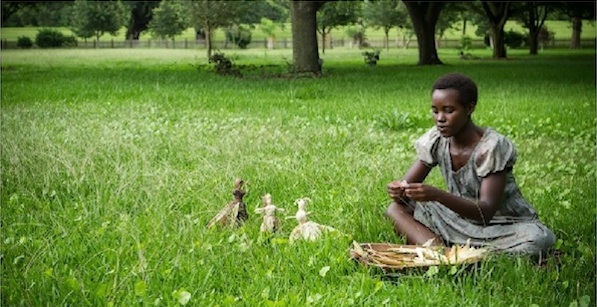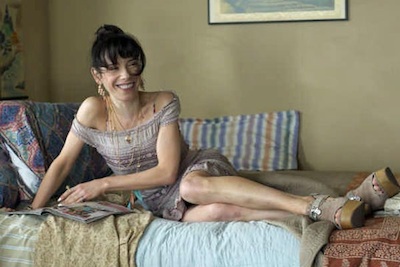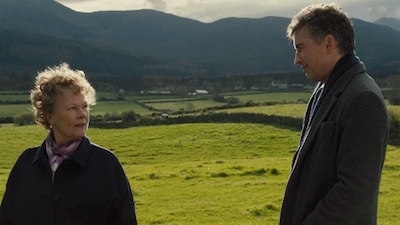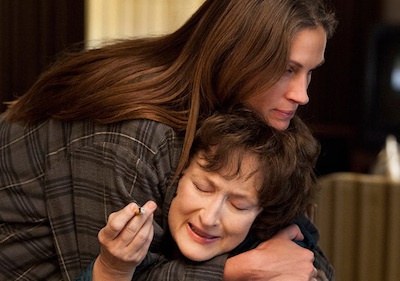[This is the first of a three-part dialogue between R. Kurt Osenlund, Managing Editor of The House Next Door at Slant Magazine, and Kevin B. Lee of Fandor’s Keyframe, in response to the Oscars 2014: Video Evidence series produced by Kevin on Keyframe.]
Kurt Osenlund: Kevin, first I want to acknowledge how refreshing it’s been to watch your “Video Evidence” series this season. There have been some great pieces by writers like Mark Harris that address the varying healthiness levels of how we relate the Oscars to sociopolitical issues, but this is a series that turns down the noise and isolates the art, which isn’t always an easy thing to do.
With that in mind, I thought I’d start by discussing Lupita Nyong’o’s work in 12 Years a Slave, since hers is the performance with which we seem to be most at odds. It’s also the one that’s surely the trickiest when it comes to divorcing oneself from real-world connections and simply assessing the craft.
I believe you’re right in your opinion that much of what viewers have been responding to relates to the horrors Nyong’o’s slave character, Patsey, endures, especially given the unflinching brutality with which Steve McQueen has chosen to depict this story. A showy, cerebral formalist beholden to “beautified” horror, McQueen, in my eyes, is always obstructing the work of even his best actors in some way. So it’s easy to lose certain nuances of the performers’ work in the process. I’m not suggesting you missed anything when evaluating Nyong’o’s acting. But in regard to our respective readings of her performance, whereas you largely saw a “hapless recipient” of horrors, I saw an actor inspired to conjure something deeply primal within herself.
[Watch what Kevin had to say about Lupita Nyong’o’s performance, and the other Supporting Actress nominees:]
Unlike any other nominated actress this year, in any category, Nyong’o is handed a character with hardly a single shred of personal agency, born into a doomed life entirely beyond her control. Patsey isn’t even afforded the will to commit suicide—for that, she must solicit Solomon Northup (Chiwetel Ejiofor) for help, which merely proves to be another hopeless scenario. To this, Nyong’o needed to find a way to bring something of substance, something basely humane and relatable with which to fill in the gaps.
I’ll admit that, when I first saw 12 Years a Slave, I was more moved by Adepero Oduye’s turn as Eliza, the slave who’s first sold with Solomon and stripped of her two children. But Oduye, with all of her mournful wailing, is given more to work with as an actress, and I wonder if my reaction to her pain being stronger than my initial response to Patsey’s had something to do with the loss of family being a more realistic terror than a lifetime of bondage and abuse. This is the same conundrum Nyong’o faced: How do I emotionally ground and physically occupy someone who’s not only bereft of free will (and, by a certain extension, ample characterization), but whose circumstances are unimaginable?
I don’t want to steer too far from your objective of looking squarely at the work. But I think, as audiences, we’re hardwired to respond to performances in which actors, particularly female actors, assert degrees of control in a very cathartic way. It’s why Nyong’o’s scene with the soap, the one moment in which she shows any resistance toward her owner, Epps (Michael Fassbender), is the one that’s making the rounds at awards shows. But at no other point is Patsey truly given “a voice,” so to speak, and it was Nyong’o’s task to summon that “voice” from her gut, bringing something achingly, almost imperceptibly active to an extraordinarily passive role. Having seen the film again, I’d say she’s easily this year’s nominee who makes the most of very little.
Kevin B. Lee: Kurt, I can’t say I really disagree with anything you’ve said on behalf of Nyong’o; she basically summons all the grit inside her tiny frame to hit those powerful expressive moments when she is finally given opportunity to do so. And why do I suddenly have the image of an Olympic figure skater in my head? Maybe because that soap scene is the acting equivalent of a triple axel triple toe loop. Or maybe because in both instances there’s a similar kind of fascination going on with young talent reaching beyond itself. Lord knows Nyong’o’s role amounts to a physical endurance test. I guess this “cathartic” breed of performance, to use your word, just isn’t something I readily embrace, partly because, like Olympic figure skating, it’s so easily embraceable as visceral spectacle.
In contrast, Sally Hawkins in Blue Jasmine doesn’t perform any triple axel-triple toe loop showstopping moves. Hers is more a showcase of impeccable technique that doesn’t draw attention to itself with any fancy jumps, but is more an accumulation of small but telling gestures (smiles, adjustments of her hair, looks that skate gracefully between warmth and anxiety). Skating experts have been complaining that the sport currently places too much emphasis on athletic pyrotechnics and attention to delicacy and artistic interpretation has eroded. I fear the same is going on here.
Looking at her counterpart in the Best Actress category, I read your assessment of Cate Blanchett’s current Oscar chances, and I have to wonder if journalists are grateful for Woodygate to give them something to discuss in this category, otherwise we’d all be twiddling our thumbs until her name gets called on March 2. But as I wrote earlier, I think there’s a real discussion to be had concerning Sandra Bullock’s performance in Gravity, not so much because it’s necessarily “better” than Blanchett’s, but because it provokes a lot of questions about just how a performance is put together, and who is doing the putting together. A good chunk of the film we don’t see her but we hear her; and even sometimes when we see her floating out in the great void, is it really just a stunt double in a space suit, with her voice in the soundtrack assuring us otherwise? And is that necessarily a bad thing, especially given the brouhaha over Scarlett Johansson’s snub for her impressive voice work in Her? (Just as an aside, I think the voice work of Idina Menzel and Kristin Bell in Frozen were as deserving as Johansson’s, but no one takes Animated performance seriously).
[Watch Kevin’s evaluation of Sandra Bullock, Cate Blanchett and all the Lead Actress nominees:]
This is all a far cry from the long takes in Blue Jasmine that let Blanchett unfurl her acting talents in plain sight, something that we’re very familiar with. But Bullock’s performance is the kind we may see more of in the future, and it challenges us to re-evaluate our criteria for judgment. We’re already seeing this kind of analog vs. digital divide play out in the cinematography department, with Gravity (and last year’s Life of Pi) demonstrating how films are “shot” in the editing room with computer compositing. Little did we suspect the same to apply to performances.
I’d love to hear your thoughts on this – and also get your take on the other leads. Do you think Amy Adams is the Sally Hawkins in this category? Did Judi Dench need more Big Momma’s House scenes to make her a serious contender? And how did Meryl Streep become an Oscar afterthought after setting the record for most scenery ever devoured at a dinner table?
Kurt: Let me humbly say that you clearly know a lot more about Olympic figure skating than I do. But I like the analogy, especially in regard to how you use it to contrast Sally Hawkins’s work from Nyong’o’s. This idea of comparing “athletic pyrotechnics” to paying “attention to delicacy and artistic interpretation” is extremely apt when it comes to singling out what Hawkins brings to Blue Jasmine.
I’ll freely share that, despite being part of the mob that booed when Hawkins was snubbed for Happy-Go-Lucky, and now barks a “toldja so” at the Academy for finally inviting her to join the likes of Paul Giamatti in their Atonement Club, I wasn’t initially bowled over by Hawkins’s Ginger. But that, of course, is the point. There’s not a lot about her performance that leaps out at you; it begs for no attention. What I find really interesting is that, had I not already been aware of Hawkins’s abilities, or, furthermore, of the fact that she and Blanchett were so close on set, I might think that her turn was somewhat composed of actor-ly insecurities, and that Ginger’s uncertainties around Jasmine were in part a reflection of Hawkins expressing a certain inadequacy in the shadow of Blanchett’s “pyrotechnics” (which are, naturally, in no short supply).
Even though I recently re-watched Blue Jasmine (on a plane, and not in first class), I don’t think I needed to in order to appreciate that actor-ly-ness isn’t what Hawkins is giving us. I still don’t know if she would’ve made my own shortlist, but her expert subtleties, as you acknowledged, gradually convey just how well she knows Ginger. And I personally identified very strongly with what she was able to access in terms of how we can become impressionable when exposed to aspects of a life we might think we want, and swayed from the easily trivialized virtues of personal contentment.
This is as good a point as any to segue to Amy Adams, whom you lovingly suggested might be the Hawkins of the Best Actress race, and who has gone on record multiple times saying that her character, Sydney, is someone who truly doesn’t know what she wants, let alone who. I believe we share the opinion that American Hustle is a thing of wild (and widely misunderstood) greatness, and I wouldn’t change a single performance in it. But Adams is the only actor from the ensemble whose insights into her character and process interest me. However deftly Jennifer Lawrence, Bradley Cooper, and Christian Bale are all operating in the manic, mask-wearing key of the American Hustle machine, the runaway train theatricality of it all seems to have stretched beyond the grasp of David O. Russell, who, to me, is either putting on airs or missing his own film’s point when he preaches that it’s about “real people and characters.”
Adams seems the only part of this operation who’s truly plumbing such depths, and she somehow manages it while seamlessly being part of the same machine as her co-stars. Sydney is easily her beefiest role to date, letting her tap into virtually every human emotion amid a character arc that, apart from an (intentionally) overwrought accent, never has Adams grabbing you by the lapels. In that sense, I don’t know if Adams is the Hawkins of this category, but she’s surely the Hawkins of American Hustle itself.
I’m not going to spend too many keystrokes on Judi Dench, except to say that I apparently found her work in Philomena much more accomplished than you did, and felt that such moments as the Big Momma’s House scene, or any scene in which Philomena was confronted with something—gay sex, class issues—that might be taboo or challenging for older ladies, was handled with commendable grace, especially when measured against the shriller bits of June Squibb’s work in Nebraska.
But I think I’ll end with some quick notes on the drastically different performances delivered by Sandra Bullock and Meryl Streep, two actresses who also squared off in this race four years ago. I don’t think anyone in our awards-pundit-sphere has made a better case for Bullock than you did in your video breakdown, and I swear I’m not just saying that because we’re having this friendly ping-pong. Her turn is, as you said, a new kind of performance, one that practically serves as a vessel for the awestruck audience. Many naysayers have argued that a “stronger” actress would have made for a better vessel; however, the only points at which I found her presence “weak” were due to shortcomings of Gravity‘s script.
In my Best Actress write-up for Slant, I referenced The Net when discussing Bullock’s work here, not just because it’s another film that shows how she can commandingly hold attention when left by her lonesome with electronics, but because it’s another film that unexpectedly benefits from her accessibility as an actress. There’s something about putting a Hollywood sweetheart in this intimate peril that’s much more sensible than, say, employing the comparatively chilly Blanchett in such service. In Gravity, Bullock’s acting is relatable in addition to being, as you observed, novel.
On the other end of the spectrum is Streep, whose bag of tricks couldn’t be more tired by contrast. Before August: Osage County was even released, I had a chat with our mutual friend and fellow actressexual* Dan Callahan about the palpable, definitive arrival of Streep Fatigue. This ostensibly turns our focus from the work to audience response, but in Streep’s case, the two have grown intertwined in the sense that the populace is so utterly familiar with Streep’s more-is-more technique. I do believe Streep remains preternaturally capable of achieving marvelous human nuance amid her trademark metamorphoses, but August: Osage County is perhaps the strongest evidence to date that, without a discerning director, she may very well, to paraphrase Violet Weston, eat a role alive.
*To give credit where it’s due, “actressexual” is a term that was coined by Nathaniel Rogers of The Film Experience, and it refers to a person uncommonly obsessed with all things actresses.
R. Kurt Osenlund is Managing Editor of Slant Magazine’s The House Next Door. Critic & contributor for Slant, Filmmaker, Details, Indiewire, Esquire, Time Out NY, RogerEbert and other publications. Follow him on Twitter.
Kevin B. Lee is a filmmaker, critic, video essayist and founding editor of Keyframe. He tweets at @alsolikelife.








